Story Highlights
- Satisfaction with upward mobility chances up from 2014
- Americans much less satisfied with income/wealth distribution
- Democrats least satisfied with mobility chances
PRINCETON, N.J. -- Six in 10 Americans are satisfied with the opportunity for a person in the U.S. to get ahead by working hard. This is up from 54% last year, which was similar to satisfaction levels measured in the prior three years. However, from 2001 through 2008, Americans' satisfaction with the ability to get ahead by working hard was higher, ranging from 77% to 66%.
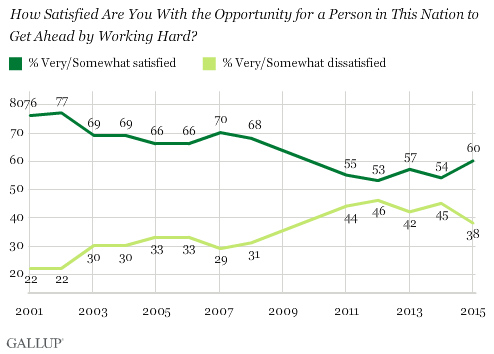
The latest measurement comes from Gallup's annual Mood of the Nation survey, conducted Jan. 5-8. Clearly, Americans' satisfaction with the chances to get ahead are linked to their views of the economy; when the recession hit and economic confidence dropped, so did Americans' satisfaction with the chance to get ahead. Now that is moving back up again, so are views of mobility.
The ability to get ahead by hard work is just one component within the broad spectrum of concerns about economic inequality. Another component is satisfaction with the way income and wealth are distributed. Americans' satisfaction is much lower on this measure, with 31% satisfied and 67% dissatisfied, than on the ability to get ahead.
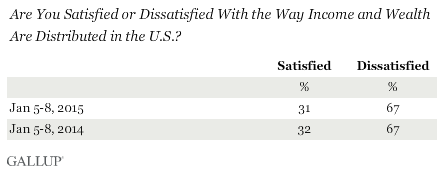
In recent years, President Barack Obama has addressed both of these issues, calling for a "fair shot" for Americans to be able to get ahead by working hard, while at the same time calling for higher taxes on the rich to help distribute income and wealth more equally. Gallup's measures show that Americans are more dissatisfied with the way financial rewards end up being distributed than they are with the lack of equality of opportunity.
Americans can be placed into four categories based on their responses to these two questions.
- A little less than a third (31%) of Americans are dissatisfied with both the opportunity to move up and the current system of income and wealth distribution.
- Another quarter (24%) of Americans are satisfied with both economic mobility and economic equality.
- Most of the rest (35%) are satisfied with the opportunity for mobility in the country, but not the amount of equality.
- A small group (7%) are dissatisfied with mobility, but OK with the distribution of income and wealth.
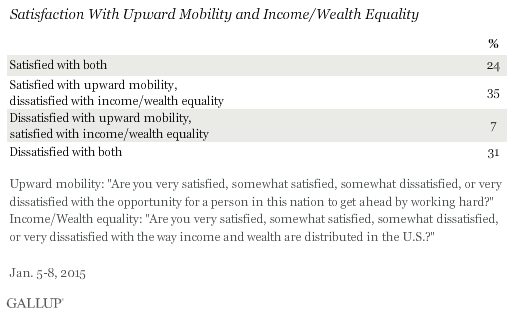
Three-quarters of Americans are dissatisfied with at least one of the two aspects of inequality, but with differing views about which aspect of the system is out of balance. Overall, however, there is clearly more dissatisfaction with the way income and wealth are distributed than dissatisfaction with the chances Americans have to get ahead.
Democrats Most Dissatisfied With Inequality of Results
Roughly the same percentages of Republicans/Republican leaners and Democrats/Democratic leaners are dissatisfied with both aspects of the nation's economic system. However, Democrats are about half as likely as Republicans to be satisfied with both (17% vs. 30%). At the same time, they are significantly more likely to be satisfied with the opportunity to get ahead while feeling dissatisfied with the income and wealth distribution (44% vs. 28%).
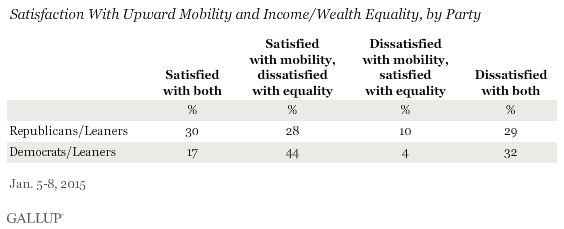
Middle-income Americans -- the "middle class" toward whom Obama aimed much of his recent State of the Union address -- are in fact more likely than those making less than $30,000 or making at least $75,000 to be dissatisfied with both aspects of inequality, and are less likely to be satisfied with both.
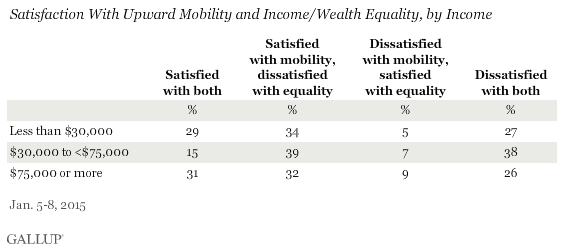
Implications
Despite Obama's and others' concerns that Americans are increasingly unable to have a fair shot at getting ahead, a majority of Americans continue to say they are satisfied with the chance for upward mobility in the nation today. This level of satisfaction fell during the recession, but has inched back up this year as the recovery has taken hold. The years ahead will show whether these views return to pre-recession levels, or whether attitudes have undergone structural change such that public cynicism about mobility becomes stagnant, even when the economy continues to improve.
On the other hand, dissatisfaction is relatively high with the way income and wealth are distributed in the country today, indicating that the public's concern is focused more on the inequality of results as the system plays out, rather than on the chances people have of improving their lot within the system. These attitudes are not new. 优蜜传媒polling over the decades has consistently shown that Americans believe in U.S. society, and have consistently supported higher taxes on the rich to help achieve that aim.
Obama's policy in recent years has increasingly emphasized these broad issues, including his recently promulgated proposals relating to "middle-class economics." His plan to increase taxes on the rich in order to pay for more tax breaks for those who are less rich resonate with underlying American attitudes. His other plans designed to give more Americans a "fair shot" at economic success -- such as free community college and expanded pre-K education -- may be popular individually, but have less attitudinal support, given that the majority of the public is satisfied with Americans' ability to get ahead if they work hard.
Survey Methods
Results for this 优蜜传媒poll are based on telephone interviews conducted Jan. 5-8, 2015, with a random sample of 804 adults, aged 18 and older, living in all 50 U.S. states and the District of Columbia. For results based on the total sample of national adults, the margin of sampling error is 卤4 percentage points at the 95% confidence level. All reported margins of sampling error include computed design effects for weighting.
Each sample of national adults includes a minimum quota of 50% cellphone respondents and 50% landline respondents, with additional minimum quotas by time zone within region. Landline and cellular telephone numbers are selected using random-digit-dial methods.
Learn more about how works

